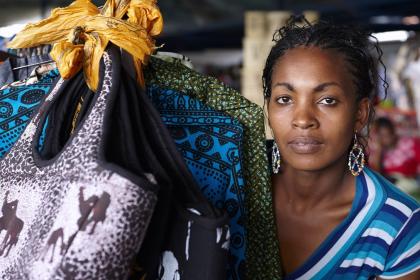The interactions between trade and gender are complex and context specific. Therefore, making trade policies more gender-responsive requires sound national statistics.
Statistical authorities, however, in most cases lack data and tools for the measurement of gender and trade. This is especially the case for developing countries where women are most vulnerable and statistical capacities less developed.
At the signing of the December 2017 Buenos Aires Declaration on Trade and Women's Economic Empowerment, countries called for the sharing of methods and procedures for the collection of sex-disaggregated data, and the analysis of gender-focused statistics related to trade.
The project is a joint effort of UNCTAD, ECA and ECE to develop a coherent approach to measuring the impact of trade on gender equality and analysing the related impacts of COVID-19 using official statistics and building on the existing statistical data and capacity of countries.
The expected result will be an enhanced capacity of national statistical authorities to collate and disseminate data and statistics for policy makers for more gender-responsive trade policy and to analyse the gendered impacts of COVID-19 transferred via trade.
In the longer term, the project will enable a more coherent review of progress towards inclusive trade policy and equitable economic development as part of the 2030 Agenda.
The project aims at developing the existing statistical data on employment, wages and salaries, as well as turnover, productivity and profitability of businesses from the gender perspective. These data also enable the assessment of the effects of COVID-19 through trade, including by different types of businesses, i.e. SMEs, and by gender. The project will advance the use of evidence as a basis of gender-responsive trade policy and in support of the economic and social recovery from COVID-19.
Objective
To strengthen the capacity of selected countries in Africa, Eastern Europe, the Caucasus and Central Asia to develop and use statistics for more gender-responsive trade policy and to inform the analysis of the gendered impacts of COVID-19 through trade.
Trade influences the employment and business opportunities, income, social status, welfare and equality of women and men in various ways. Therefore, it is suitable to identify which are the relevant issues that need to be measured with data and statistics to ensure "leaving no one behind" in trade. At the same time, these data are relevant for the analysis of the related impacts of COVID-19 by gender.
Intended Outcomes
- Increased capacity of national statistical authorities, policy makers and other trade stakeholders in the beneficiary countries to develop a conceptual framework that would address the data needs on trade and gender and to assess the effects of COVID-19 through trade.
- Enhanced technical capacity of national statistical authorities to collate data and statistics and formulate plans to improve the availability of data needed for gender-responsive trade policies and for assessing the effects of COVID-19 through trade.
Sustainability
The project is launched at the request of trade policy makers to improve data and statistics for gender-responsive trade policy, and due to the increasing pressure to measure the impacts of COVID-19 on women and men through trade. Governments of the beneficiary countries have demonstrated commitment to "leaving no one behind" and developing more inclusive and gender-responsive trade policy.
Link to the SDGs:
The primary target of this project is Goal 5 on gender equality. Gender is a theme that cuts across the 2030 Agenda for Sustainable Development. There are 53 indicators that explicitly refer to sex, gender, women and girls. The project contributes to 20 indicators, out of the 53 gender disaggregated indicators, that relate to economic empowerment, women's possibilities to participate in trade and the economy, and to benefit from them. Furthermore, target 17.10 calls for the promotion of "a universal, rules-based, open, non discriminatory and equitable multilateral trading system…" The review of progress towards this target would benefit directly from better availability of information on the gender dimension of trade.
Monitoring
The project will be monitored on a continuous basis at the level of outcomes to assess whether outputs are progressing in line with the project plans and whether implementation challenges exist.
Final Report
The final report will provide an overview of the project and its achievements.
ECA and ECE will provide input on their part of project implementation, including on outputs completed, results achieved, use of funding etc. in line with the final report template.
The input will be submitted to UNCTAD, who will formulate the draft final report on the project.
Once agreed by implementing entities, the final report will be submitted to the Development Account Programme Management Team by the end of March 2024.





